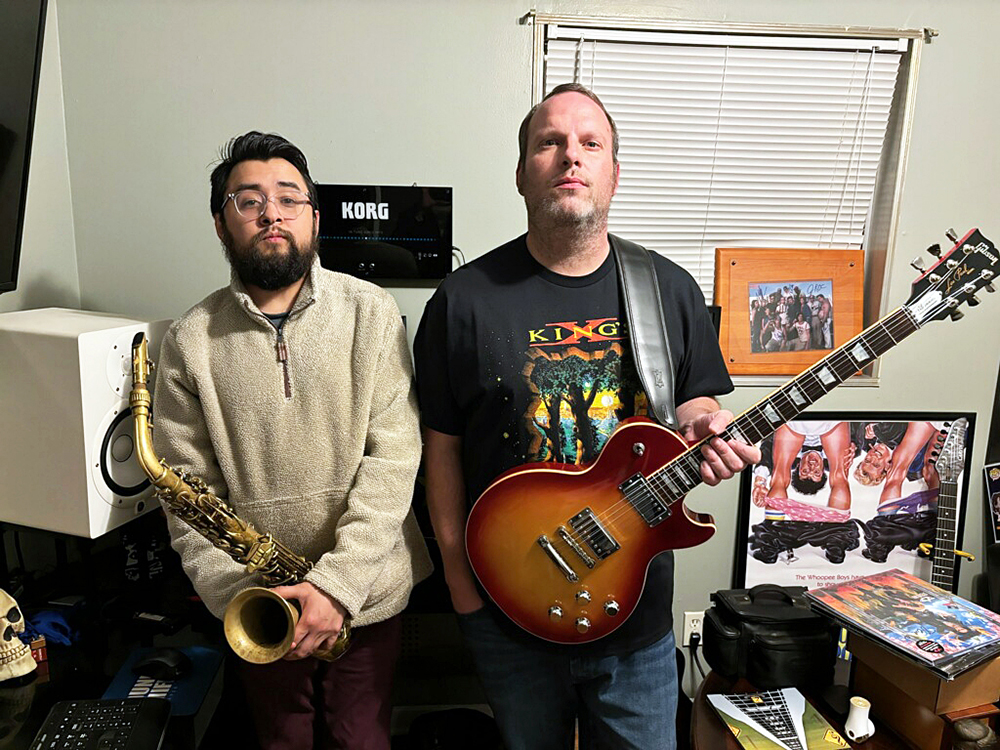Jeff Williams has been in two groups since he began playing guitar: Sacrum and his newest band, Light and Shade.
Sacrum was the heavy metal band he was in when he was in his mid 20s, says Williams. “‘Sacrum,’” he says, “sounds heavy. It’s so hard. Every metal band always had some name like ‘Rotting Corpse’ or ‘Rotting Death Carcass.”
They wanted a name like that, but they didn’t want to “go all horror movie with it.”
Fast forward 13 years to Light and Shade. It’s not heavy metal. It’s all instrumental. It even has a saxophone in it. People have called their sound “modern jazz” and “post rock,” Williams says. “People have called us ‘psychedelic.’”
“Anything can be psychedelic if you take enough,” adds saxophonist Josh Aguilar.
Others have also called them “folk” or “post folk,” Williams says. “I think of ‘folk’ as some dude sitting in an old smoky club singing some Dylan-y stuff.”
Their music has “that film thematic sound to it,” which makes it perfect for movie soundtracks, Williams says.
“Honestly, I just think of it as good instrumental music.”
Light and Shade, which also includes Harvey Waldman from Sacrum on drums, released its self-titled album in December.
When he was writing songs like “The Haunting” and “The Eyes” for Sacrum, Williams also was writing instrumentals similar to Light and Shade material. He didn’t want all his songs to be that “heavy metal gray kind of thing,” Williams says. “I wanted to paint with some different colors.”
He wanted to write instrumentals because he wanted to make people feel good. “I wanted to write some stuff anybody could listen to and not have to be a music nerd. I wanted people to feel it.”
A native Memphian, Williams “grew up on everything from classic rock, Led Zeppelin, Pink Floyd, The Doors — stuff my dad listened to. Grand Funk Railroad.” He also listened to his brother’s tapes. “Anything from your hair metal stuff. Your Winger and Warrant. And your Whitesnake and your Dokken.”
Later it was grunge. Stone Temple Pilots and Alice in Chains.
Sacrum was “a power groove metal band,” Williams says. “The music was kind of progressive. People called us death metal or black metal, but we weren’t. It was just because we were so heavy and my brother was screaming.”
Sacrum, which was together from 2005 to around 2011, “did end up opening for a lot of national acts,” Williams says, adding, “We were going after it pretty hard. We had a lot of ‘almosts’ and ‘what ifs’ like everybody does.”
But, he says, “It just started to dissipate after a while of making no money. We all just had to get jobs and do whatever.”
Williams even thought about getting out of music altogether. “There was a period where I really thought about saying, ‘Fuck it.’ We’ve done it so long. I’ve made zero dollars. I only put money into it. We were all poor. Nobody had a rich uncle who could be the angel investor and help us make a record.”
Things changed in 2012 when Aguilar got a job at the Jimmy John’s where Williams was working at the time. They began jamming together. “Anybody could record shitty demos on their computer.” But, he says, “Shit started sounding like something. Sounded better.”
After more than 10 years of writing new songs, newer versions of the songs, and refining arrangements, they decided to go into a studio “to get a better sound,” Williams says. “We had the longest pre-production ever.”
They recorded “the whole album in five or six days” at Young Avenue Sound.
Waldman, who lives in Los Angeles, was still able to add his drum parts. “We recorded the whole album to a click track.” The drummer was “only in town for a couple of days and he knocked everything out at once.”
Light and Shade doesn’t totally get away from his old sound, Williams says. “Jafar,” one song on the album, has “heavy distorted guitars on it.” And, he — perhaps fondly — adds, the song “brings back a bit of the metal.”
